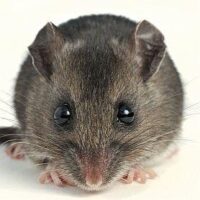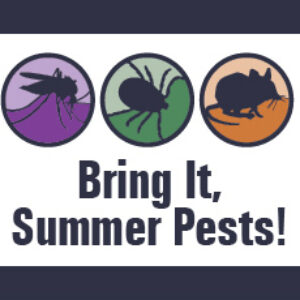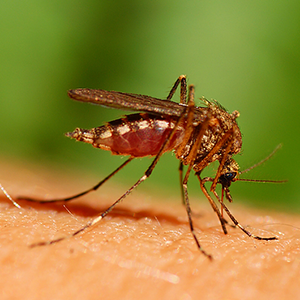Contact Us
Overview
Hantavirus is a viral infection spread by certain rodents. People can be infected through contact with infected rodents or an infected rodent’s urine, saliva or feces. There are several types of hantavirus; one type, called Sin Nombre virus (SNV), can progress to become Hantavirus Pulmonary Syndrome (HPS), which can be fatal.
Basics

Hantavirus is the name given to a group of similar viruses found in the U.S. and North America. In Washington state, hantavirus is spread by the deer mouse. When infected, deer mice can pass the disease to each other, but they do not get sick or show any symptoms. Typically, one to five cases are reported in Washington each year. All cases of hantavirus in Washington were caused by SNV. See the fact sheet to learn how to identify a deer mouse.
Transmission
Rodents shed the disease in their droppings, urine and saliva. Infection can happen in different ways.
The main way a person can become infected is by breathing in the tiny, virus-containing droplets that float into the air when dust or contaminated mouse nesting materials are stirred up. When cleaning up mouse droppings or nests, it’s important to avoid raising dust or stirring particulates into the air.
Scientists believe people may also get the virus by touching contaminated materials (and then touching their eyes, nose or mouth) or by eating food contaminated with an infected mouse’s saliva, droppings or urine. While rare, people can also get the disease by being bitten by an infected rodent.
Activities that can put people at risk for contracting hantavirus are listed below.
- Cleaning and/or working in previously unoccupied buildings, particularly in rural settings, such as barns, sheds, cabins, garages or storage facilities where mice may have nested
- Housecleaning activities pose potential threats if rodents have infested the home
- Exposure can also happen at work sites, especially in construction or in the pest control industry
- Camping and hiking can pose some threat in instances where campers or hikers use infested trail shelters or camp in rodent habitats
- Cleaning rodent-infested cars, campers and trailers can also pose a threat
There are no reports that the hantaviruses found in the United States can be transmitted from person to person, so touching, kissing or sharing food with an infected person will not result in illness. Hantavirus in the U.S. has not been observed in dogs, cats or other animals besides rodents.
HPS
HPS is a serious disease affecting the lungs and other parts of the body. Symptoms begin two to six weeks after inhaling the virus and include sore muscles, fever, headaches, nausea, vomiting, diarrhea and fatigue lasting 3-5 days. If the disease gets worse, the lungs fill with fluid and cause shortness of breath and coughing. Once the lungs are affected, hospitalization is necessary. About a third of those diagnosed with HPS die.
Diagnosis
It can be difficult to determine if a person has hantavirus because the early symptoms, muscle aches, fever and tiredness, are like influenza. If a person has been exposed to rodents and is experiencing shortness of breath along with deep muscle aches and fever, they should see their doctor as soon as possible for correct diagnosis.
Treatment
There is no cure for hantavirus infection, but intensive medical care can help. It is a serious disease and about one in three people diagnosed with HPS die. Early diagnosis is very important, the sooner treatment begins, the more effective it will be.
Sources
Hantavirus | Washington State DOH | https://www.doh.wa.gov/YouandY...
HPS | Washington State DOH | https://www.doh.wa.gov/ForPubl...
Hantavirus | CDC | https://www.cdc.gov/hantavirus...
Hantavirus Pulmonary Syndrome (HPS) | CDC | https://www.cdc.gov/hantavirus...
In Washington State
In Washington state, hantavirus-infected deer mice can spread the disease. Deer mice live all over the state, so people are at risk for HPS anywhere in Washington. There are usually one to five cases of HPS reported each year in Washington state. Learn more about vector-borne diseases in Spokane.
Recommendations
The best way to avoid exposure to hantavirus is to limit exposure to rodents, their feces and urine, and dust contaminated with the virus. Prevent rodents from entering buildings by:
- Sealing up holes and gaps in the home or garage to prevent mice from getting in
- Placing traps around the home
- Cleaning up easy-to-reach food
Research indicates that many instances of HPS develop in people who have had frequent contact with rodents and/or their droppings in their homes or workplace. For those who live in areas where hantavirus-carrying rodents live, it’s important to take measures to prevent rodents from invading the home, workplace or camping/hiking shelters.
If a mouse infestation occurs, there are precautions to take when removing rodent debris and disinfecting affected areas. See recommendations for safely cleaning up rodent debris and learn how to clean up a mouse infestation in a vehicle.
Sources
Hantavirus | CDC | https://www.cdc.gov/hantavirus...
Related Facts
According to the Washington State Department of Health, about one to five cases of hantavirus are reported in Washington state each year.

Bring It, Summer Pests!
Confront disease-carrying mosquitoes, ticks and mice during spring and summer months. Simple landscaping tricks and tips to protect home’s exterior.

Animals & Insects Program
Preventing the spread of disease from animals to humans is a public health responsibility.
